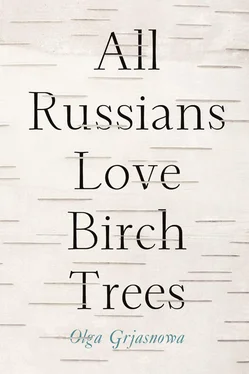“Do you want to spend the day with me?” she asked and coldly looked around the room.
“Why? So I can swallow tear gas?”
“Would you rather while away the day at the beach?”
“I wouldn’t mind that.”
The last time I joined Tal for a protest, we’d stood at a bustling intersection and yelled rallying cries. We were about thirty people, almost exclusively white and Jewish. Standing around us were at least as many people who berated us and called us traitors and sons of bitches. One spit at us and another wanted to throw his heavy shopping bag at Tal. A couple of police officers held them back. I’d been at the edge of the demonstration, next to two guys who were quietly discussing in Arabic which leftie they wanted to fuck next. The lefties were the only ones who spread their legs for an Arab, said the younger of the two. A shame that they always wanted to talk politics afterward, said his buddy.
“Masha, what kind of life do you want to lead?”
“A quiet one.”
“Seriously?”
“Yes.”
Tal remained standing and crossed her arms. Her eyes rested on my mouth, calculating. I wouldn’t give in. I was going to play all my cards. But she wouldn’t be convinced as easily — nor as quickly — as Elisha.
“You just want to sit out your time here and enjoy the sun, the good food, and a bit of sex? Nothing else matters to you, does it?” Tal sat down and pulled her knees toward her.
“Exactly. My place in the sun.”
“I don’t believe it.” She got up and started pacing again. Her movements were erratic.
“What I want is running water, electricity, and a place where no one is killed,” I said.
“You were in a good place in Germany then. No reason to come here.”
I hadn’t told her about Elias or his death. I crossed the room barefoot. The floor was full of the sand that Tal must have brought in from the beach. She was always barefoot, in the stairway and the garden, too, and all the dirt stuck to her heels and ended up on my floors and, finally, in my bed.
“My grandmother still has memories of a peaceful Germany,” Tal added.
“You think mine doesn’t?”
“The demonstration is in Sheikh Jarrah. We should get going.”
I had spent the weekend with Ori and Tal at the house of their parents, who had gone to Europe. We wanted to take advantage of the time to talk things through. Ori and Tal’s parents are something like the Israeli Mayflower generation. Their father had grown up in a kibbutz in the north of the country, their mother in a spacious apartment in Tel Aviv. If something in the state went wrong, they took it personally. Their grandparents had illegally immigrated from Eastern Europe, prior to the state formation. Israeli pioneers who had personally drained swamps.
Their father had served in a unit of parachutists and was not what you would call squeamish. Up until the day his sister and her husband were killed in an attack during the second intifada. They had been on their way to Ori’s bar mitzvah. This tragic event changed the entire family. Tal became angry and Ori skittish. Their parents didn’t entertain any feelings of revenge, but instead bought a small winery in the north of Israel and withdrew — hoping to take their kids as far from the intifada as possible. They only produced a few thousand bottles per season. The family business was real estate that they rented out to tourists.
The winery was the perfect idyll, but Tal and Ori discussed politics nonstop. Because they fought in Hebrew I wasn’t clear on the details. I knew that Ori had had it with realpolitik. Anyway, he was convinced that it was too late to divide the state. Tal was Tal. And their parents, who had once gone to demonstrations in favor of the two-state solution, blamed the Israeli right and the settlers, and had stopped believing in anything. The whole family knew that more people would die.
The conflict had reached its climax when Tal noticed that Ori used a shaving cream produced by an Israeli company in the Occupied Territories. She had found the cream in the bathroom and brought it out to the yard where Ori and I were playing badminton. Tal held up the cream in about the same way she would have held up a dead rat.
“Whose is this?” Tal asked.
Ori calmly dropped his racket on the grass and asked, “What’s your problem?”
Thereupon Tal delivered a long and passionate speech that we would have also found on the Web site of Who Profits, had we been looking for it. Tal talked herself more and more into a frenzy until Ori took her in his arms and shook her firmly.
“That’s enough,” he repeated over and over. “That’s enough. That’s enough. That’s enough.” Tal burst into tears and beat her fists against his chest. She beat and he held and she beat and he held, and I was standing in the corner, clutching my racket. At some point Tal softly placed her forehead on Ori’s chest and sobbed.
Later, I watched her from the doorway, sitting on the sofa, staring at the TV. Ori was upstairs, in his room. Finally, I sat down next to Tal. She didn’t say a word. Her hands had chronically bad circulation and were therefore always cold, but today they seemed even colder than usual. I made her tea, which she didn’t drink. I folded her hands around the mug to warm them and brushed a strand of hair from her face. But I knew all was lost.
In the evening she took a bath while I sat on the rim of the tub. Despite the warm water her body wouldn’t stop shivering. I kept watch to make sure her head stayed upright. When she got out of the water I carefully dried her off. Goose bumps covered her body and her legs were still quaking slightly. She collapsed into my arms, her body suddenly very heavy, and I brought her to bed. I dressed her in her mother’s pajamas and lay down beside her. In the middle of the night I heard her get up, but I pretended to be asleep and let her go.
The next morning Ori announced that he would fly to India that same day. Actually, in three hours. Tal was gone. She had left a note on the kitchen table: “I’m in Sinai. Have to think things over.”
The sun was blinding. I had forgotten my sunglasses and squinted at the crowded street as we slowly crept forward. In the other cars commuters yawned.
Ori was beside me, quiet and focused, changing the radio station every two minutes. His body was tense. A Jeep with soldiers approached us. Ori waved at them. They waved back.
We were late. I parked the car and Ori stormed out. I trudged behind. In front of him in line was a group of Bulgarian tourists. Most of them wore hats with their travel organization’s logos, name tags, and big golden crosses. Ori disliked all Slavic languages. The line didn’t move. The tourists spoke a lot, and quickly. They bustled like confused ants, exchanging their impressions. A little girl wailed to be held by her father.
Ori cast a grudging glance. His gaze darkened as it wandered from one face to the next. Boarding was to begin in fifteen minutes. He stroked my cheek and said, “I’ll try to get past them.” He dug around in his bag, took out his passport, and kissed me on the cheek. His right hand lifted my chin. He looked at me as if he wanted to memorize my features.
“See you soon.” I turned away from him, unable to bear it any longer.
“When I get back, you’ll be gone.”
“How would you know that?”
“You’re a woman who falls in love quickly.”
“If you only knew …” I laughed.
His left hand made a gesture that could have meant anything. He ran toward the counter, sweeping past the tour group. He juked the tour guide like a running back, clutching his blue Israeli passport to his chest before being tackled by two armed security guards. As they threw him to the ground and handcuffed him, I had the feeling I was in a sports arena. The tour group pulled out their cameras, but other security forces loudly commanded them to abstain from documenting the scene.
Читать дальше












